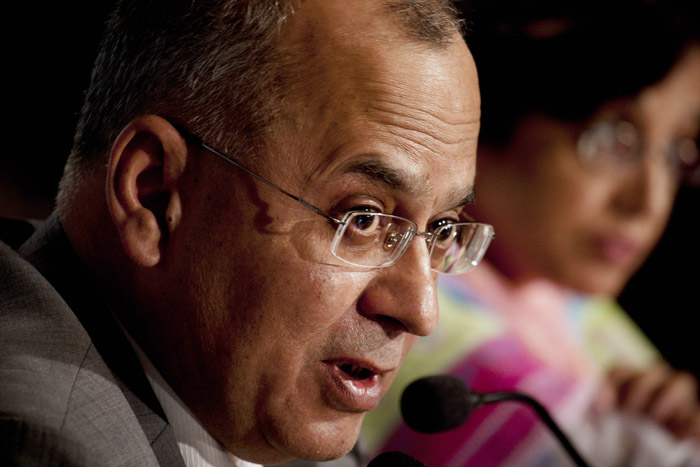ISLAMABAD, Pakistan — Pakistan’s powerful army today broke its silence about the U.S. raid that killed Osama bin Laden, acknowledging intelligence “shortcomings” in its own failure to find the terror mastermind but warning the United States against carrying out another such operation.
In a combative statement, a group of top generals known as the corps commanders said any similar U.S. raid would prompt Pakistan to review its military and intelligence cooperation with the United States.
Already, the statement said, the army had decided to reduce the number of U.S. military personnel in Pakistan “to the minimum essential.” That was an apparent reference to demands made in Washington two weeks ago by Pakistan’s spy chief, who asked for a drawdown in CIA personnel and U.S. special forces soldiers following the shooting of two Pakistanis by a CIA contractor.
At the same time, the statement cited Pakistan’s “own shortcomings in developing intelligence on the presence of Osama bin Laden in Pakistan,” and said an investigation had been ordered. Hours earlier, Pakistan’s foreign minister denied that an investigation was planned or even needed, saying questions about bin Laden were “for historians.”
The conflicting statements came as Pakistani officials faced rising domestic and international backlash about the helicopter-borne assault on bin Laden’s compound by U.S. commandos.
Today, Foreign Secretary Salman Bashir appeared to question the legality of the U.S. operation. Citing United Nations Security Council resolutions on counter-terror operations, Bashir told reporters that the “modalities for combating terrorism raises certain legal and moral issues.”
“Everyone concerned ought to be mindful of their international obligations,” he said.
On Tuesday, the foreign ministry in a statement expressed “deep concerns and reservations” that the U.S. carried out the mission in the city of Abbottabad unilaterally, without Pakistan’s knowledge or permission.
Such comments differ considerably from Pakistan’s statements in the hours after the killing, when Prime Minister Yousaf Raza Gillani called bin Laden’s death a “great victory.”
The preservation of national sovereignty, particularly against incursions by U.S. troops, is a highly sensitive issue in nuclear-armed Pakistan, and both the presence of bin Laden and the dramatic American raid that killed him have greatly embarrassed the military here.
But though clearly directed at the United States, the suggestions that the operation might have breached international law also appeared to be a warning to Pakistan’s archenemy and nuclear-armed neighbor, India, which has been targeted in terror bombings and attacks by Pakistani militants.
On Wednesday, India’s army chief said his forces were capable of carrying out a raid similar to the successful U.S. operation — a notion Bashir called “bravado.”
“We feel that sort of misadventure or miscalculation could result in a terrible catastrophe,” Bashir told reporters here.
Bashir denied, once again, that his country had knowingly sheltered the world’s most-wanted terrorist, and indicated that there would be little introspection inside Pakistan about how and why bin Laden was able to reside here, under the nose of the military.
Playing down reports that there would be an inquiry into Pakistan’s role, Bashir said: “we are in a constant process of viewing at every level. … This is a routine. So I think we should not try to give it a slant in terms of an inquiry. There’s no such thing as an inquiry.”
Bashir also provided additional details about Pakistan’s role in the years-long search for bin Laden, and about its actions the morning of the raid. He said two Pakistani F-16 fighter jets were deployed in response to the U.S. operation. By the time the jets reached the compound, the raid was over.
He said a cellphone number for bin Laden’s trusted courier was discovered by Pakistan’s top spy agency and provided to the CIA, which used it to locate bin Laden’s compound. U.S. officials have said they were monitoring the courier’s phone and email communications and found him when he contacted a family member.
Bashir contradicted previous Pakistani statements that Abbottabad, the city where bin Laden was hiding, was under “sharp focus” since 2003 — a year when, a Pakistani intelligence official said earlier this week, the construction site for what would become the bin Laden compound was first raided.
Satellite images provided by U.S. officials, however, show there was no building happening on the property at that time.
Today, Bashir said Abbottabad first surfaced on Pakistan’s radar as an al-Qaida hideout in 2004, when the driver of Faraj al-Libbi, an al-Qaida operative who would be arrested by Pakistan in 2005, was traced to the garrison city.
Send questions/comments to the editors.



Success. Please wait for the page to reload. If the page does not reload within 5 seconds, please refresh the page.
Enter your email and password to access comments.
Hi, to comment on stories you must . This profile is in addition to your subscription and website login.
Already have a commenting profile? .
Invalid username/password.
Please check your email to confirm and complete your registration.
Only subscribers are eligible to post comments. Please subscribe or login first for digital access. Here’s why.
Use the form below to reset your password. When you've submitted your account email, we will send an email with a reset code.